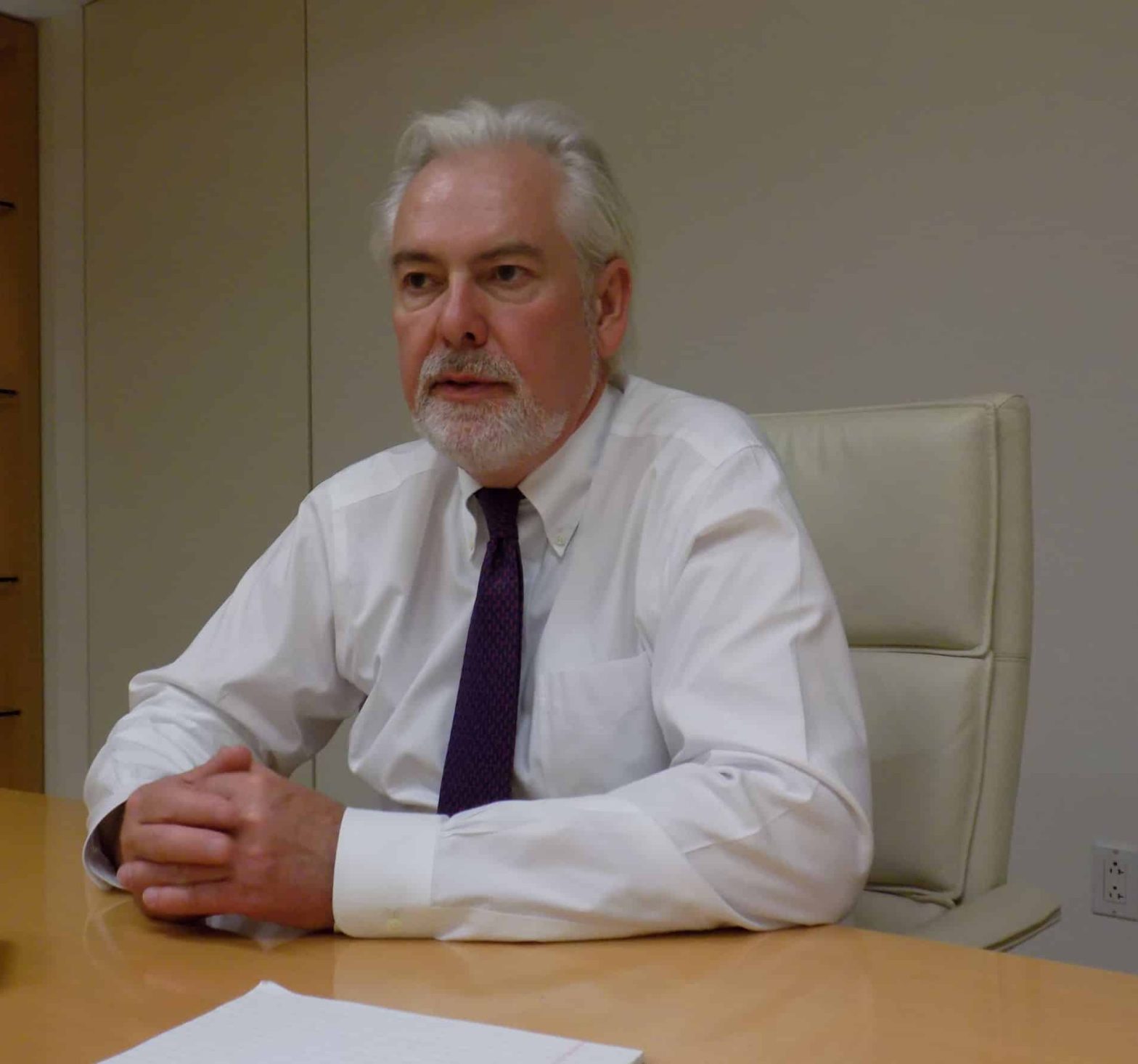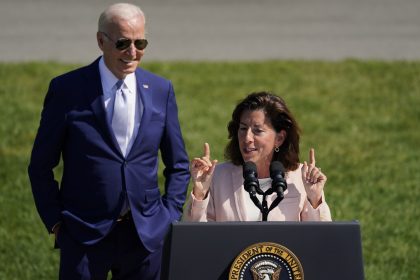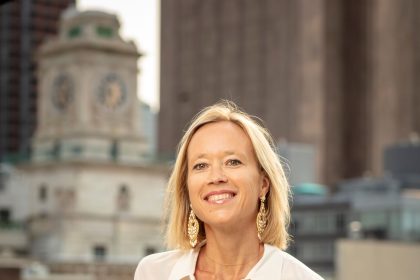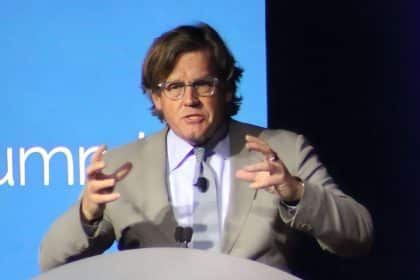Thinking Differently Ushers in Changes, Brand New Day at Philip Morris International
PARTNER CONTENT

NEW YORK — The Well News caught up with Philip Morris International’s Chief Executive Officer at the company’s soon-to-be former corporate headquarters in midtown Manhattan ahead of its big move to Stamford, Connecticut, beginning Nov. 10.
Jacek Olczak appeared to be pleasantly surprised as he walked into the conference room and straight into a casual, pre-interview conversation about music.
“He was close personal friends with The Ramones,” said Corey Henry, the company’s spokesman as a sort of introduction to the interviewer.
With that, the CEO of a company that currently has a market cap of nearly $140 billion raised an eyebrow and let out an appreciative sigh.
He may lead what many analysts describe as the world’s 71st most valuable company, but it turned out Olczak is an unrepentant music fan and guitar aficionado.
“I’ll tell you all about our product and our company, but first let me show you this,” he said as he reached for his phone and took a seat at the conference table across the street from and high above New York’s Grand Central Station.
After a few flicks across its screen, he handed the phone over with a barely repressed smile.
Its screen revealed a photograph of an impressive electric guitar, the body of which appeared to be mostly white, but accented with light gray speckles.
“It’s a one and only,” Olczak said with evident pride as he went on to explain that the instrument is the first guitar made using recycled elements from PMI’s heated tobacco platform.
With that, the executive nimbly took a small plastic rectangle, a tiny charger containing the heated tobacco device itself, and a pack of tobacco consumables which look for all the world like tiny cigarettes from a distance.
“Because you’re not burning anything, the finished product looks exactly like what you started with,” Olczak said, pulling the depleted tobacco stick from the device and holding it out in the palm of his hand before placing it in a white receptacle.
“And that raised a question, is there something else we can do with this? Because in the past, with cigarettes, you always wound up with a dirty end-product — the cigarette butt — that hopefully wound up in an ashtray, but often wound up being tossed on the street, creating a negative environmental impact.
“With this, because it is mostly paper and not burned, we can clean up, compress it, and use it to make something else,” he said of the used tobacco consumables. “In fact, there’s an Italian interior designer who has produced a whole line of furniture, tables and chairs, using them.”
“Frankly, I didn’t believe at first that he could do it, but once he did, I said, ‘Okay, we’ve got to do something to encourage these efforts.’ As a result, we’re organizing a program where consumers will be able to bring the used tobacco consumables back to the point of sale or another location so that they can be recycled.”
“The thinking being, if we can encourage consumers to move from smoking to the alternative, perhaps we can actually start addressing other problems as well,” Olczak said.
Bringing the conversation full circle, he then reflected on how music stimulates “other” parts of the brain and often helps people see things from new and different perspectives.
“For a lot of people, going to the gym or following a fitness routine is a way to rest the brain,” he said. “That’s what music does for me.”
Somehow, and quite by surprise, there could have been no better place to start a discussion of Philip Morris International’s present and future and this unique moment in Olczak’s career.
Hard Work, Investment Result in Better Product
Philip Morris International has spent the past decade and $9 billion researching, developing and commercializing smoke-free products intending to effectively bring the curtain down on the era of smoking, while continuing to serve the hundreds of millions of consumers globally who don’t quit smoking.
Launched in a test-pilot city in Japan in 2014, PMI’s smoke-free products are now available in 70 markets worldwide.
Since their introduction, the company estimates that 13.5 million adult smokers have switched to its’ leading smoke-free product and since stopped smoking altogether.
“Basically, this effort was driven by executives at PMI who said, ‘we produce a product that causes harm, and we have a very large number of consumers who, no matter how many times they are informed of the risks associated with smoking, exhibit a very low willingness to quit,” Olczak said.
“And the question was, ‘What are we going to do about it?’ explained Olczak when discussing the company’s motivation for developing a range of acceptable alternatives for adult consumers that have the potential to be less harmful for them than continuing to smoke.
“And it took many iterations to get where we are today, because while we thought we knew tobacco, there were tons of things we did not know at the start of this process,” he continued.
“What we did have going for us was a willingness to admit there was a problem, because if you don’t do that, there’s no need to look for a solution.
“The commitment to solving this problem became a part of our culture, and it is not window dressing. We really mean it,” he said.
PMI’s leading smoke-free product is the only inhalable, smoke-free, nicotine product authorized as a Modified Risk Tobacco Product, by the Food and Drug Administration. Last month, PMI announced it had reached an agreement with former parent company Altria to end the companies’ commercial relationship covering PMI’s heated tobacco product in the U.S. as of April 30, 2024. From that date on, PMI will have the full rights to commercialize these products in the U.S.
As part of the agreement, PMI will pay a total cash consideration of $2.7 billion, of which $1.0 billion was paid at the inception of the agreement using available cash. The remaining $1.7 billion, plus interest, will be paid by July 2023 at the latest.
“Today marks another historic milestone in our journey towards a smoke-free future,” and provides a “… clear path to fulfilling the product’s full potential in the world’s largest smoke-free market,” Olczak said when the announcement was made on October 20.
A New Home, A New Start
Although PMI has been publicly listed on the New York Stock Exchange since the spin-off from former parent company Altria in 2008, PMI has never operated in the United States.
Olczak likened the impending move to Stamford, Connecticut, to “a blank sheet of paper” saying it will help PMI reposition itself in the marketplace.
Olczak explained that the company’s extensive scientific knowledge gained through experience of developing smoke-free products is now helping the company move beyond tobacco and nicotine into the wellness and health care category.
“That ultimately led us to the realization that office space renewal was not for us. We needed something new, something bigger, to accommodate all our new capabilities, and we want to build an organization around them,” he said.
By happenstance, it was around this time that Olczak was introduced to Connecticut Gov. Ned Lamont, whose openness to embracing the company surprised him.
“It was … refreshing,” he said. “Because, after all, we’re living in a world where it is much easier to say, ‘You’re a tobacco company and we don’t like you. We don’t want you.’
“But the governor understood what we were trying to do. My business going forward is not in the tobacco business as we know it … and frankly speaking, there is another part of the business that we’re trying to build that has nothing to do with tobacco. He understood, I want to leave a legacy behind.”
Olczak said he did not ask for incentives or other financial benefits from the state, because the emblematic nature of the move to a state defined by Yale and other universities and a growing biotech sector was incentive enough.
“Studying the whole thing, it just made sense. First, the move would be a good refresher of our image, and a strong indicator that we are serious about going in a different direction,” he said.
“The other thing about it is that as we continue to grow toward wellness and health care, we will need access to a labor force of scientists, specialists, technicians and engineers, and other companies that operate in this ecosystem and Connecticut has that,” he said.
The new headquarters isn’t the company’s only real estate move in the U.S.
It is also building a manufacturing facility in North Carolina to manufacture the tobacco consumables for its heated tobacco product, including tobacco grown by North Carolina farmers.
“There’s nothing inherently wrong with tobacco itself, and nicotine naturally exists in tobacco,” Olczak said when he sensed a question was about to be raised. “The problems start with how we consume it, which traditionally is by burning it and releasing a whole host of toxins.
“From the start, we’ve called our product a smoke-free alternative, but we’ve never called it a risk-free alternative. The best thing any adult smoker can do is to quit tobacco and nicotine altogether. But as I said earlier, what we’re offering with our portfolio of smoke-free products is a better choice for those adults who would otherwise continue to smoke.”
“To me one of the most important aspects of this evolution we’re involved in is the knowledge this lengthy process has given us about the human respiratory system and how that knowledge can be used for completely different applications,” he said.
Broadening Horizons
In fact, what’s grown at PMI during the development of its smoke-free products is the belief that it can play a decisive role in an entirely new field — that of inhaled drug delivery solutions.
In the past two years the company has acquired U.K. asthma inhaler maker Vectura, American inhaled drug specialist OtiTopic and Danish pharmaceutical and well-being products manufacturer Fertin Pharma.
It has been widely reported since that PMI’s 2025 goal is for at least $1 billion of its net revenues to be generated from products outside tobacco and nicotine, such as self-care, wellness, and inhaled and oral therapeutics.
“Our goal isn’t to be a pharma company, but I do think we have capabilities that naturally lend themselves to this area,” Olczak said. “We’ve talked publicly, for instance, about aspirin. It has long been said that people should take an aspirin a day to ward off a heart attack or at least reduce the detrimental effects of one.
“Unfortunately, when taking one it has to go through your entire digestive or gastrointestinal system before it’s effective, and that can take 20 minutes or more,” he said. “But if you deliver the same aspirin using an inhaler of some kind, it has a bioavailability of just two minutes — that is a difference of 18 minutes and a difference that can save a life.”
“That same thing applies to pain medication. If you feel pain, you take a pill. If it’s not better in an hour, you take another. We believe inhalation can work in this situation as well. Now, we’re not pharma, but we do think we have capabilities that can add value to these products, and that’s the horizon that is out in front of this company.
“Now if you had said that 10 years ago, people here at Philip Morris would have thought you’d lost your mind or allowed your imagination to wander off into unpractical territory, but today, these flights of imagination are seen as something that’s needed, because you just may come up with new solutions to age-old problems.”
Thinking Differently
Music and doing business in America proved to be constant threads woven through the conversation as Olczak laid out his vision for PMI’s future.
“I could have been Eric Clapton,” he laughed before explaining that Philip Morris had “interrupted” his musical career 29 years ago.
“When I was a teenager, we had a band that played basic blues kind of music — all of us home trained, of course — learning the music off recordings,” he said.
“And I remember one time, during martial law in my native Poland, before the collapse of the Berlin Wall, I was stopped by the police because I was carrying a guitar case, which they thought hid a gun.
“By the time I explained I wasn’t going to shoot the regime, I’d spent a nice few hours in the jail, waiting for my mother … and at that time they could expel you from school for something like that,” he said.
In time, the band gave way to studies in university and marriage, but Olczak continued to pursue his love of music, playing at home any chance he got.
“In time we relocated to Germany … a few other places … Romania … and finally Switzerland, and because it seemed like we’d be staying for a while, we decided to buy a home,” he said.
At the time, Swiss houses were being converted from oil to gas, which resulted in the removal of the large oil tanks that dominated many cellars.
Seizing the opportunity, and with his wife’s agreement, Olczak turned the space into a music room which today is populated by three guitars, drums, a trumpet, a saxophone and a keyboard.
“It was my dream come true,” he said, though he quickly realized expanding opportunities and responsibilities at work were preventing him from ever using it.
In response, Olczak began keeping a guitar at work, playing with headphones so as not to upset anyone.
“The relationship of music to my business life is I really believe you should be doing something different during the day to keep yourself fresh,” he said. “It’s good for the brain.”
“But it’s difficult, when you’re in an executive job, to find an activity that is remote from what you’re doing. You might watch a movie, but you immediately watch a movie that has some correlation to business. Same goes for books. And what happens is, you turn off your mind.
“Today, music is my mental refresher,” he said.
It has also served as his entree into American culture.
Where there was a time in his youth when he would pine for a bass guitar like Gene Simmons played with Kiss, today he marvels at the fact that he can still occasionally find a band like 1970s progressive rock heavyweights King Crimson on New York radio.
And he can be evangelical with his own kids when it comes to the music he grew up with.
“I have a 14-year-old son who until very recently was judging music by the year it came out,” he said. “If I told him a song was recorded in 1990, he’d be like, ‘Get it away from me.’ And that applied even to things from the early 2000s.
“So, I said, ‘Look, I’m going to play you some music and not tell you when it’s from, and I want you to just listen to it before you judge it … and wouldn’t you know it, he’s now listening to some Louis Armstrong.
“Now, I’d never tell him how old those records are, but they’re pretty old. You can almost smell how old they are. But at least he’s discovered some good music.”
Olczak said he applies a similar open-mindedness as he gathers a sense of the country he’s now poised to do much of his business in.
“I’m European. I’m Polish. And I have opinions about America, but I know they’re based on limited experience and are certainly not the only opinions you can have about America,” he said.
“And I think at the heart of the strength of Philip Morris as a company is it has allowed differing views about the places we do business, rather than trying to monopolize those conversations.
“I mean, it’s very easy to present yourself as an expert in something, even if the knowledge you possess about it is only a fraction of a footnote, but I’m very clear on the fact that even though I’m familiar with quite a few restaurants in Manhattan, that doesn’t make me American.
“And being humble in that way is not a bad quality,” Olczak continued. “I can remember when I moved to Germany — I was managing director there and our offices were in Munich, which is in Bavaria.
“My first week there, my German colleagues told me that I needed to understand one thing — that I was not in Germany. I said, ‘What do you mean?’ They said, ‘You’re in Bavaria.’
“‘So what difference does that make?’ I said. Now I know the difference. And every country is the same. I have colleagues in Indonesia, who refer to it not as one place, but as hundreds of places. And of course, this sense of diversity is something you use in your decision-making.
“I understand that the United States is as diverse as any other country, at the same time, it’s hard not to see it through the prism of the many great innovations that have been developed and adopted and scaled here,” Olczak said.
“Many of the things we enjoy today, in terms of technology and science, came to us from the U.S. and were created, initially, in the service of solving an important societal problem.
“That’s why I believe we’ll receive a strong reception here,” said Olczak who hopes that stakeholders in the United States will be genuinely excited about the potential smoke-free innovations have to help accelerate an end to smoking.
“For years what was preached was that everybody should give up smoking, and yet despite the taxation and pricing regulations and promotion of healthier lifestyles, 31 million Americans still smoke — despite the risk and everything else.
“So, I’m positive that in this country, where people are open to innovation, open to science, open to change, that they’ll embrace these products and we’ll get the right level of acceptance.”
To drive his point home, Olczak points to Japan, the first market PMI ever served with its smoke-free tobacco product.
“When we began marketing our product in Japan people told us, the culture is very different from your own, they have quite a high smoking rate and have shown no inclination to change … and seven years later, 30% of all smokers in Japan are using our product. Never in the history of public health intervention in smoking has anything of that magnitude been achieved in that period of time.
“And we now have real world data, hospitalization data and the like, to show what the product has achieved both in the market and on an individual basis. We can see that we’ve changed the curve.
“We have proof of acceptance from consumers. We have proof of concept. And we have scale outcomes,” Olczak said, expressing a confidence that positive change is also possible in the United States.
This article was produced in partnership with and paid for by Philip Morris International.























